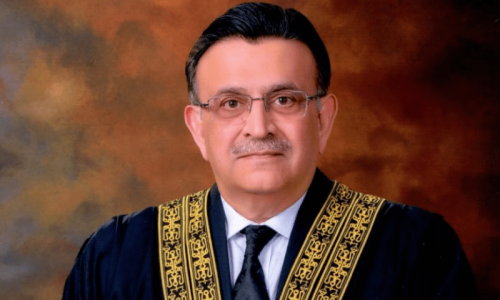Observes ‘parliament being kept incomplete’ by design
• Says PTI’s way ‘blocked’ after party decided to return to NA
• Terms elections ‘real answer’ to all such issues
ISLAMABAD: Chief Justice of Pakistan Umar Ata Bandial hinted on Thursday that the court could call former prime minister Imran Khan to explain why he was contesting by-polls from multiple seats, if he did not want to join parliament.
“How about asking the gentleman to explain what is the point of contesting by-elections if he is not going to join the National Assembly?” the country’s top judge asked, referring to the PTI chief. “Should we call him?”
Justice Bandial was heading a three-judge Supreme Court bench, which resumed hearing Mr Khan’s petition against the August 2022 amendments to the National Accountability Bureau (NAB) ordinance. The bench also comprised Justice Syed Mansoor Ali Shah and Justice Ijazul Ahsan.
Mr Khan has argued that the new NAB laws violated fundamental rights.
Justice Bandial’s observation came when Justice Syed Mansoor Ali Shah wondered about the role of the opposition in parliamentary democracy.
“Could the opposition walk out of parliament instead of debating a bill put before the assembly? And when, eventually, the final product came in the shape of enactment in the absence of opposition members, could they then be considered authors of the bill and could the authors then approach the courts to challenge the same law,” Justice Shah observed, also reminding that no one from the public had challenged the amendments before the court except for the petitioner, who did not debate the law in parliament.
Pointing towards senior counsel Makhdoom Ali Khan, who is defending the amendments before the apex court, Justice Bandial regretted the political turmoil and conflict prevalent in the country, which emerged in the wake of Mr Khan’s strategy to boycott the assembly. But when his party showed readiness to return to the parliament, their resignations were accepted, he observed.
The real answer to all such issues was elections, Justice Bandial emphasized, wondering why the court should not send this matter back to the people of Pakistan to decide. He recalled how eight months ago, the chief election commissioner, in a challenge to the then speaker’s ruling, had assured the court that the Election Commission could hold elections by November 22.
“But now, we are in February 2023 and the parliament has its own life until August 2023 — a parliament which is being kept incomplete voluntarily, thus the legislation of amending the accountability law is becoming controversial,” Justice Bandial observed.
Challenging Mr Khan’s locus standi in the present case might not be a good point since he was a former prime minister and head of one of the largest political parties with a strong backing of the masses, the top judge observed, adding that the court did not like to interfere in the legislative businesses.
Justice Bandial recalled that the government of a former prime minister (Mohammad Khan Junejo) “considered the most honest” was sent packing by invoking the now-defunct Article 58(2b) of the Constitution.
Justice Ijazul Ahsan observed that being a minority in the parliament did not mean that they should be deprived of their rights, and when the minority genuinely felt that the law being made was manifestly self-serving, “could the court discourage them by not taking up their plea?”
On by-elections, the government counsel argued that Imran Khan was aware how much money was going down the drain and costing the nation by running from six constituencies, but retaining only one.














